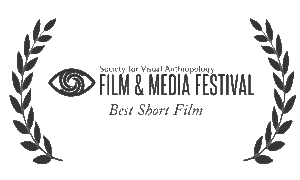Fejos Postdoctoral Fellowship: Martha-Cecilia Dietrich
In 2017 Dr. Martha-Cecilia Dietrich received a Fejos Postdoctoral Fellowship that gave her the opportunity to make, Horror in the Andes, a documentary film that in her words focused on “a two-year long investigation into the local horror film production in the Peruvian highlands and the films’ rising popularity among local audiences”. We are proud to share the following trailer and blog post.
Horror In The Andes – teaser from Filmmaking For Fieldwork on Vimeo.
Horror in the Andes
Fejos Postdoctoral Fellowship
‘Horror in the Andes’ is an observational documentary based on a two-year long investigation into the local horror film production in the Peruvian highlands and its rising popularity among local audiences. The film follows three film-makers Martin, Lucho and Carlitos whilst shooting a horror movie in the small town of Ayacucho. It is an intimate description of a friendship that is held together by a passion for cinema and the commitment to the arduous process of film-making. Horror in the Andes premiered at the RAI film festival in March 2019 and will be screened in mainstream and ethnographic film festivals as well as conferences in Europe, Latin America and Africa in the coming year.
This research-led documentary aimed at embedding the practice of filmmaking as both, methodological tool and principal subject of analysis with a focus on horror fiction filmmaking as a means to render violent pasts and articulate notions of Andean identity. As applied in this project, ethnographic filmmaking is a method for the systematic exploration of what the documentary film pioneer Dziga Vertov (in Grimshaw 2003, 28) referred to as the “world in movement,” that is, a way of analyzing the processes of social transformation and cultural manifestation, not as abstract systems but as experience or practice. The ethnographic filmmaker’s endeavor is always an exploration of the world inscribed by the researcher’s ways of seeing or looking (MacDougall 2006, 7). What is meaningful to the filmmaker shapes content and form that is given to the story and the people of the film. How stories are told, its spatial, practical and performative aspects, invite to reflect on the epistemological and aesthetic imperatives that guide vision and creation – theirs and mine. This epistemology of vision materialized in composed images and sounds, which turned into a constructed narrative representing and communicating research findings to an audience.
The presence of two cameras filming alongside each other revealed a certain politics of gazing, a way of looking, of looking away and being looked at in the process of observing and being observed. It also had the effect of challenging these boundaries of clearly distinguishing between behind and in front of the camera, performer and spectator, researcher and researched. It is precisely in this threshold between framing and being framed created by the shared endeavor of capturing expressive beauty and power and in moments of triumph and failure, where relationships, experience and critical reflection took place. The ethnographic material used in this film and discussed in accompanying texts is the result of this engagement.
The work carried out during the fellowship period included the editing of the film, the writing of a related article entitled Re-imagining Andean-ness: identity politics in contemporary Ayacuchan horror cinema (submitted to the Journal of Latin American and Caribbean Anthropology) and festival submissions.
Past and scheduled Screenings (last updated on 1. June 2019)
- The Swiss School of Latin American Studies (SSLAS) – Workshop “Héroes y pueblos” / “Heroes and the people” Universidad de Berna 14-15 December 2018
- RAI film festival – official selection (special interest) commendation for Richard Werbner Award, 27-30 March 2019 (Premier)
- VdR – Media Library Selection, 5-13 April 2019
- IUAES 2019 Inter-Congress “World Solidarities” audiovisual programme in Poznan, Poland, 27-31. August 2019
- Oaxaca Film festival, 4-10. October 2019
- Inshort Film festival/Lagos, November 2019
Link to website: https://filmmakingforfieldwork.co.uk/horror-in-the-andes
References:
Grimshaw, Anna. 2001. The Ethnographer’s Eye: Ways of Seeing in Anthropology. Cambridge: Cambridge University Press.
MacDougall, David. 2006. The Corporeal Image: Film, Ethnography, and the Senses. Princeton University Press.
UPDATE:
We’re thrilled to announce that Horror in the Andes has been selected to appear at the Society for Visual Anthropology Film & Media Festival this November and has been awarded “Best Short Film” for anthropological film. The SVA Film Festival will run concurrent with the annual meetings of the American Anthropological Association November 20th- 24th at the Vancouver Convention Center. To keep track of screenings, visit https://filmmakingforfieldwork.co.uk/horror-in-the-andes
